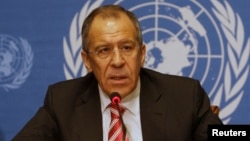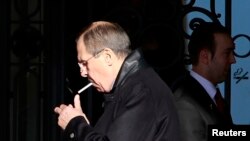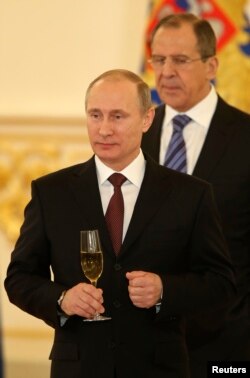Perhaps more than any other time in his long career, Russian Foreign Minister Sergey Lavrov is front and center, negotiating the Ukraine crisis with his counterpart -- and reported friend -- U.S. Secretary of State John Kerry at a moment when U.S.-Russian relations are at their lowest since the Cold War.
Those who have observed Lavrov up close use many of the same adjectives to describe the veteran diplomat: clever, funny, charming, intellectually powerful.
At the same time, Lavrov is known to be withering in his criticism, dismissive, condescending, stubborn and even icy cold.
He is widely known as “Minister Nyet,” having frustrated and clashed with former Secretaries of State Hillary Clinton and Condoleeza Rice.
As the number one representative for Russian President Vladimir Putin, Lavrov, who served as the Russian ambassador to the United Nations for a decade, has been wheeling, dealing and peddling the foreign policy goals of Moscow since 2004. And with Putin’s recent annexation of Crimea, Lavrov is holding the line for a far more assertive Russian government, one whose efforts to restore its place on the world stage has put the Obama administration and much of Europe on edge, and created the biggest diplomatic crisis in Europe since the end of the Cold War.
Charismatic maneuverer
Lavrov is hard to ignore.
“He was by far the star of the [U.N.] security council during most of his time there,” said Evelyn Leopold, who as U.N. bureau chief for Reuters news agency covered his entire 10-year-long tenure.
A chain-smoker, who openly flouted then-U.N. Secretary-General Kofi Annan’s order turning the U.N. headquarters into a smoke-free environment, Lavrov is also a well-known lover of scotch.
But he has always remained in control say those who have observed him over the years.
There is no doubt that Lavrov was and continues to be a domineering figure – one who knew the language of the U.N. Security Council law better than anyone else, said Colum Lynch, United Nations Correspondent for Foreign Policy magazine.
"He was extremely sharp and he had a kind of almost encyclopedic memory of all the kind of minutiae, all the kind of Security Council resolutions on the Middle East...in Kosovo and the Balkans,” Lynch said. “He is a master at being able to kind of work the bureaucracy, the international bureaucracy to serve his own interests."
Take Ukraine, for example.
Lynch points out that the U.N. and the Obama administration tried to place the U.N. at the center of mediating between Kyiv and Moscow. But the Russians thwarted that from the very start, realizing very quickly that the crisis would draw much more international and media attention -- and, a lot more headaches for Putin – if the U.N. ended up in that role.
So, says Lynch, Lavrov made sure that the role of mediator was given to the Organization for Security and Cooperation in Europe (OSCE), certainly a well-known organization, but a far less high-profile one.
He has been just as crafty on other thorny issues, like Syria. In endless negotiations with Kerry, Lavrov has managed to keep Moscow’s interests center stage by seizing an unexpected opening to take the lead on plans to dismantle Syria’s arsenal of chemical weapons.
Meanwhile, it’s widely believed that Russia has continued to give arms to Syrian President Bashar al-Assad, having calculated that an Assad-led government is in Moscow’s best interests.
Inside or out?
As Putin’s point man during such a delicate and tense moment in history, it remains a mystery if Lavrov believes fully in the president’s ideology that governed his move to take Crimea: that the fall of the Soviet Union was a humiliating tragedy that not only marred the grandeur of Russia, but left millions of ethnic Russians outside their homeland.
In public, Lavrov speaks the language of Russia’s importance and ascent from the depths of economic and political despair during the painful 1990s, when then-President Boris Yeltsin nearly lost control of a nascent Russian government.
But while it is impossible to get inside Lavrov’s head and heart, there is anecdotal evidence of scant desire to return to the past.
“I don’t think he misses the Soviet Union,” said Leopold. “What he did miss was having any clear instructions from the Yeltsin government. He once told Security Council representatives that he was waiting for instructions from the government, and he was heard mumbling, ‘…that is, if I have a government.’”
That said, Russia expert Angela Stent is fairly certain that Lavrov supports restoring Russia’s rightful place on the global stage overall.
But is he in Putin’s inner circle of advisors?
Stent, who as director of the Center for Eurasian, Russian and East European Studies at Georgetown University has met Putin and other Russian players many times, is doubtful.
“According to what people say to me….while he's [Lavrov’s] certainly in full possession of all the facts, he is not the decision maker,” she said. “He is an implementer.”
Leopold believes Lavrov has had a close relationship with Putin, at least before the current Ukraine crisis.
“I think he was glad that Putin gave a clear sense of direction, which he missed under Yeltsin and the foreign ministers that Yeltsin appointed,” she said. “But we don’t know what it is now. We don’t know what it is under Ukraine. One doesn’t know how much he is in the inner circle.”
The ‘real’ Lavrov
With Russia’s potential designs on parts of eastern Ukraine that pro-Russian separatists are attempting to lay claim to, it is certain that Lavrov will remain in the spotlight.
If the heft of the portfolio wears on him, it does so invisibly, says Pete Heinlein, chief of VOA’s Horn of Africa service and a former U.N. correspondent for VOA during the Lavrov years.
Lavrov, a keen chess player in life and in backroom negotiations, clearly showed passion for the game of diplomacy, said Heinlein.
“When he left the United Nations, he invited us all to his home. Everybody from the secretary-general to every permanent representative of the United Nations…but after most everybody had gone…he sat in an easy chair chain-smoking cigarettes and held forth and in the sweetest, kindest way charmed everyone with stories of how diplomats had gotten along, and the informal relationship that they had,” recalled Heinlein. “And you could tell he had affection for even his staunchest adversaries. It was quite a beautiful moment when you could the see the real Sergey Lavrov.”
Those who have observed Lavrov up close use many of the same adjectives to describe the veteran diplomat: clever, funny, charming, intellectually powerful.
At the same time, Lavrov is known to be withering in his criticism, dismissive, condescending, stubborn and even icy cold.
He is widely known as “Minister Nyet,” having frustrated and clashed with former Secretaries of State Hillary Clinton and Condoleeza Rice.
As the number one representative for Russian President Vladimir Putin, Lavrov, who served as the Russian ambassador to the United Nations for a decade, has been wheeling, dealing and peddling the foreign policy goals of Moscow since 2004. And with Putin’s recent annexation of Crimea, Lavrov is holding the line for a far more assertive Russian government, one whose efforts to restore its place on the world stage has put the Obama administration and much of Europe on edge, and created the biggest diplomatic crisis in Europe since the end of the Cold War.
Charismatic maneuverer
Lavrov is hard to ignore.
“He was by far the star of the [U.N.] security council during most of his time there,” said Evelyn Leopold, who as U.N. bureau chief for Reuters news agency covered his entire 10-year-long tenure.
A chain-smoker, who openly flouted then-U.N. Secretary-General Kofi Annan’s order turning the U.N. headquarters into a smoke-free environment, Lavrov is also a well-known lover of scotch.
But he has always remained in control say those who have observed him over the years.
There is no doubt that Lavrov was and continues to be a domineering figure – one who knew the language of the U.N. Security Council law better than anyone else, said Colum Lynch, United Nations Correspondent for Foreign Policy magazine.
"He was extremely sharp and he had a kind of almost encyclopedic memory of all the kind of minutiae, all the kind of Security Council resolutions on the Middle East...in Kosovo and the Balkans,” Lynch said. “He is a master at being able to kind of work the bureaucracy, the international bureaucracy to serve his own interests."
Take Ukraine, for example.
Lynch points out that the U.N. and the Obama administration tried to place the U.N. at the center of mediating between Kyiv and Moscow. But the Russians thwarted that from the very start, realizing very quickly that the crisis would draw much more international and media attention -- and, a lot more headaches for Putin – if the U.N. ended up in that role.
So, says Lynch, Lavrov made sure that the role of mediator was given to the Organization for Security and Cooperation in Europe (OSCE), certainly a well-known organization, but a far less high-profile one.
He has been just as crafty on other thorny issues, like Syria. In endless negotiations with Kerry, Lavrov has managed to keep Moscow’s interests center stage by seizing an unexpected opening to take the lead on plans to dismantle Syria’s arsenal of chemical weapons.
Meanwhile, it’s widely believed that Russia has continued to give arms to Syrian President Bashar al-Assad, having calculated that an Assad-led government is in Moscow’s best interests.
Inside or out?
As Putin’s point man during such a delicate and tense moment in history, it remains a mystery if Lavrov believes fully in the president’s ideology that governed his move to take Crimea: that the fall of the Soviet Union was a humiliating tragedy that not only marred the grandeur of Russia, but left millions of ethnic Russians outside their homeland.
In public, Lavrov speaks the language of Russia’s importance and ascent from the depths of economic and political despair during the painful 1990s, when then-President Boris Yeltsin nearly lost control of a nascent Russian government.
But while it is impossible to get inside Lavrov’s head and heart, there is anecdotal evidence of scant desire to return to the past.
“I don’t think he misses the Soviet Union,” said Leopold. “What he did miss was having any clear instructions from the Yeltsin government. He once told Security Council representatives that he was waiting for instructions from the government, and he was heard mumbling, ‘…that is, if I have a government.’”
That said, Russia expert Angela Stent is fairly certain that Lavrov supports restoring Russia’s rightful place on the global stage overall.
But is he in Putin’s inner circle of advisors?
Stent, who as director of the Center for Eurasian, Russian and East European Studies at Georgetown University has met Putin and other Russian players many times, is doubtful.
“According to what people say to me….while he's [Lavrov’s] certainly in full possession of all the facts, he is not the decision maker,” she said. “He is an implementer.”
Leopold believes Lavrov has had a close relationship with Putin, at least before the current Ukraine crisis.
“I think he was glad that Putin gave a clear sense of direction, which he missed under Yeltsin and the foreign ministers that Yeltsin appointed,” she said. “But we don’t know what it is now. We don’t know what it is under Ukraine. One doesn’t know how much he is in the inner circle.”
The ‘real’ Lavrov
With Russia’s potential designs on parts of eastern Ukraine that pro-Russian separatists are attempting to lay claim to, it is certain that Lavrov will remain in the spotlight.
If the heft of the portfolio wears on him, it does so invisibly, says Pete Heinlein, chief of VOA’s Horn of Africa service and a former U.N. correspondent for VOA during the Lavrov years.
Lavrov, a keen chess player in life and in backroom negotiations, clearly showed passion for the game of diplomacy, said Heinlein.
“When he left the United Nations, he invited us all to his home. Everybody from the secretary-general to every permanent representative of the United Nations…but after most everybody had gone…he sat in an easy chair chain-smoking cigarettes and held forth and in the sweetest, kindest way charmed everyone with stories of how diplomats had gotten along, and the informal relationship that they had,” recalled Heinlein. “And you could tell he had affection for even his staunchest adversaries. It was quite a beautiful moment when you could the see the real Sergey Lavrov.”






